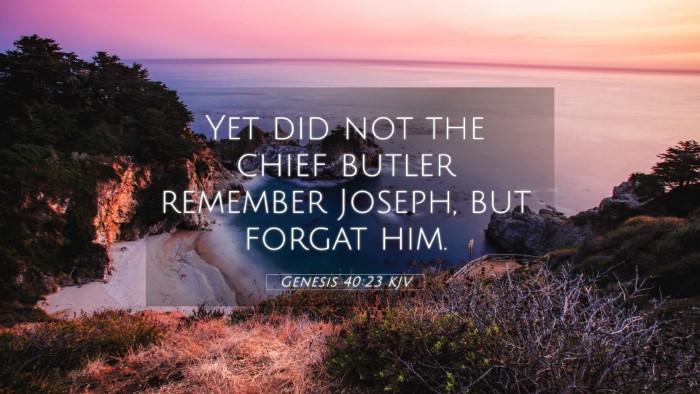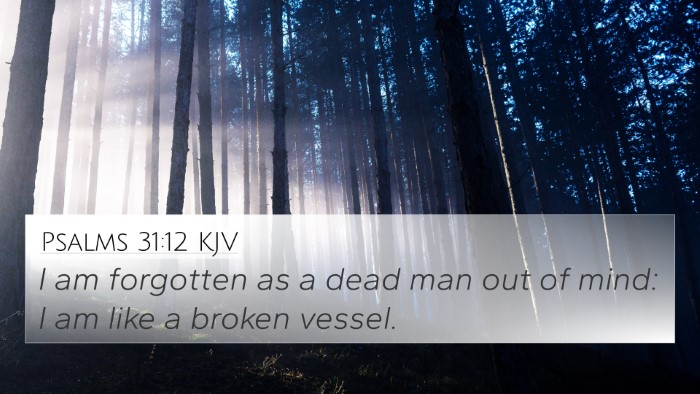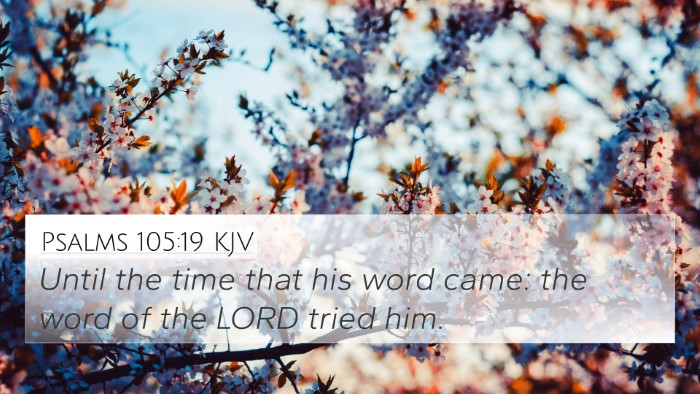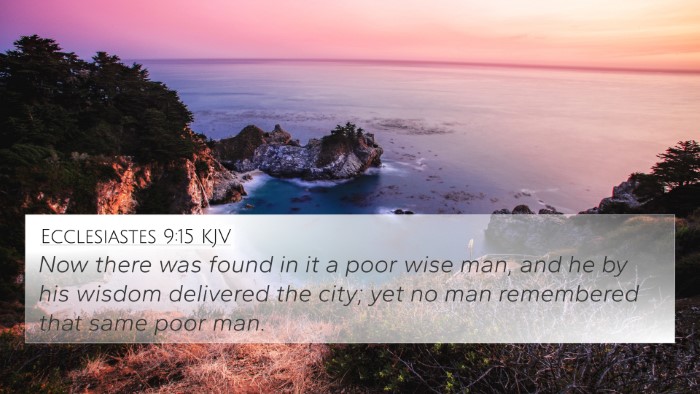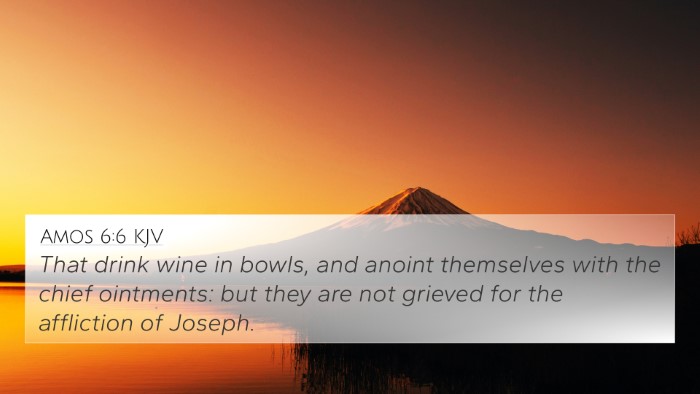Genesis 40:23 Explained
Bible Verse: Genesis 40:23 - "Yet did not the chief butler remember Joseph, but forgat him."
Summary of the Verse
In this verse, we see a poignant moment in the narrative of Joseph. After interpreting the dreams of Pharaoh's cupbearer and baker, Joseph hopes for his own rescue but is forgotten by the cupbearer once he is restored to his position. This moment serves as a critical turn in Joseph's life and highlights themes of memory, hope, and divine timing.
Commentary Insights
Matthew Henry's Commentary
Henry emphasizes that the forgetfulness of the chief butler was significant in God's plan. Although Joseph had been helpful, the butler, once freed from his misfortunes, failed to remember Joseph's plight. This neglect illustrates humanity's tendency to forget kindness once our own needs are met, highlighting the nature of human relationships.
Albert Barnes' Notes
Barnes reflects on the implication of the butler's forgetfulness. He notes that it emphasizes God’s control in Joseph's life, as it delayed the fulfillment of Joseph's destiny. This pause in Joseph's journey serves to prepare him for future glory. Barnes also connects this to the broader theme of trials leading to eventual triumph through God's providence.
Adam Clarke's Commentary
Clarke discusses the emotional weight of this verse. He expresses the sorrow Joseph must have felt, being both abandoned at a crucial time and the pivot this moment represents in the story. He posits that this incident allowed Joseph's character to develop further, leading to his readiness for his eventual rise to power in Egypt.
Thematic Connections
This verse is intricately connected with several themes seen throughout the Bible:
- Forgetting Kindness: Similar narratives across scriptures reflect the human tendency to forget others' goodness, as seen in Exodus 1:8, where the new Pharaoh forgets Joseph's contributions.
- Divine Timing: This moment of forgetfulness illustrates God's perfect timing, as also seen in Psalm 27:14, which encourages waiting on the Lord.
- Hope and Despair: Joseph's situation connects with Psalms, such as Psalms 42:5, which speak to the struggle of hope when in despair.
- God's Providence: The overarching theme of God's plan can be related to Romans 8:28, affirming that all things work together for good.
- Faithfulness in Trials: Many believers can relate to Joseph's experience through James 1:12, which encourages enduring trials for the sake of future rewards.
- Human Forgetfulness: The New Testament reflects similar themes in Luke 17:17, where only one leper remembered to give thanks.
- Preparation for Future Roles: This ties to Romans 5:3-4, where suffering produces perseverance necessary for growth.
- Separation and Waiting: Isaiah 40:31 reminds believers of renewing strength while waiting upon the Lord.
- Covenantal Faithfulness: Related to Hebrews 10:23, emphasizing our calling to hold unswervingly to hope.
- Joseph's Legacy: His eventual rise is reminiscent of the teachings in Proverbs 16:9, illustrating the Lord’s direction in our plans.
Cross-Referencing Biblical Texts
This verse can be linked with significant scripture passages that provide a broader understanding of its implications:
- Genesis 37:28 - Joseph sold by his brothers, setting the stage for his trials.
- Genesis 39:20-21 - Joseph’s imprisonment and the Lord's favor upon him.
- Psalms 105:17-19 - The divine plan in Joseph's life and the waiting period he endured.
- Hebrews 11:22 - Joseph's faith concerning his bones, symbolizing his expecting God's promise.
- 1 Peter 5:10 - A reminder of suffering enduring until restoration comes.
- Genesis 41:14 - The moment of Joseph's remembrance by the butler and divine providence revealed.
- Psalm 13:1-6 - David’s cry for help in moments of despair echoing Joseph's silent cries.
Tools for Understanding
To dive deeper into the connections between this verse and others, consider utilizing:
- Bible concordance for locating related verses.
- Bible cross-reference guides.
- Cross-reference Bible study methods for group discussions.
- Comprehensive Bible cross-reference materials available in commentaries.
- Online tools that facilitate comparisons between different scripture versions.
Conclusion
Genesis 40:23 reflects the complexity of human relationships, the divine orchestration in our lives, and the elements of waiting and hope amidst trials. By recognizing significant connections to other scriptures, we garner deeper insights into our spiritual journeys and the overarching narrative of the Bible.

